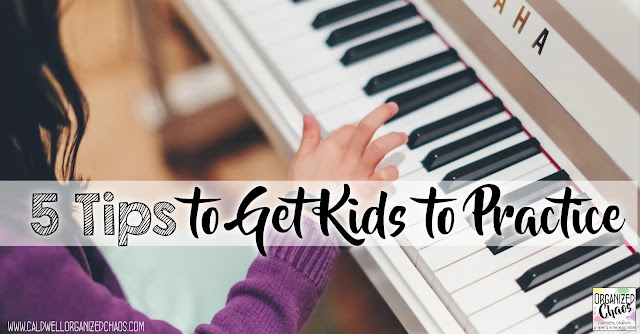1. Make it visible and accessible
My favorite tip for getting kids to practice more frequently is to have the instrument, sheet music, stand, and anything else they need to practice readily available in a place where they will see it. I keep my daughter's violin in a corner of our dining/ living room where we spend most of our time, so it is always right there. I tell my students at school to take out their instrument and put it in the living room or bedroom as soon as they get home, even if they aren't planning to practice right away. If their instrument requires assembly, I tell them to get it out of the case and put it together right away as well. Now all they have to do to start practicing is pick up their instrument! Not only does it make kids more likely to remember to practice, but it will seem like less of a chore to do so if they don't have to go anywhere or do anything to get started.
2. Give structure
I think most adults know that simply telling a child to "go practice" does no good- they have to know what to do for how long and in what way! If their teacher doesn't do this already, ask them to help you make a list of specific things to work on each week, then make a chart with each of those items listed and space to check off (or add a sticker etc) each item each day that they practice.
3. Give choices
I feel like I say this about basically every parenting topic ever, but giving choices will give children more of a sense of control and make it feel less like doing something because they have to. There are lots of easy ways to give kids options to choose from when they practice:
- Choose what order they want to practice their pieces/ exercises in
- Choose a new tempo or dynamic level for each piece/ exercise
- Choose one different exercise or excerpt to practice each day (for example: if they're working on playing middle C on piano with their thumb, have them choose a different rhythm to play it with each day, or if they're working on learning a brand new song, have them choose 1 measure or short section to practice each day)
- Make up their own song to practice (this could either be improvised or written down, and you could have them target a specific musical element they're working on or just make it a free-for-all)
- Choose when to practice (before or after dinner, in the morning or the evening etc)
4. Give breaks
Just like with anything else, taking breaks can not only help keep energy up but it will also help the brain learn better. For young kids who are probably spending shorter amounts of time practicing, this may mean taking 1 or 2 days off from practicing each week. For older children who are expected to practice more material each week/ day, this may mean breaking up each day's practice session into smaller chunks.
5. Don't force it
If the child sits down to practice but is too distracted by something else, in a foul mood, or too tired, trying to force them to continue is wasted effort in my opinion. Better to walk away, do something different, and try again later. The more we can keep playing their instrument something they want to do because it's fun, the better!
Want more insights, inspiration, and ideas sent straight to your inbox? Click here to sign up for the Organized Chaos Newsletter.



No comments :
Post a Comment